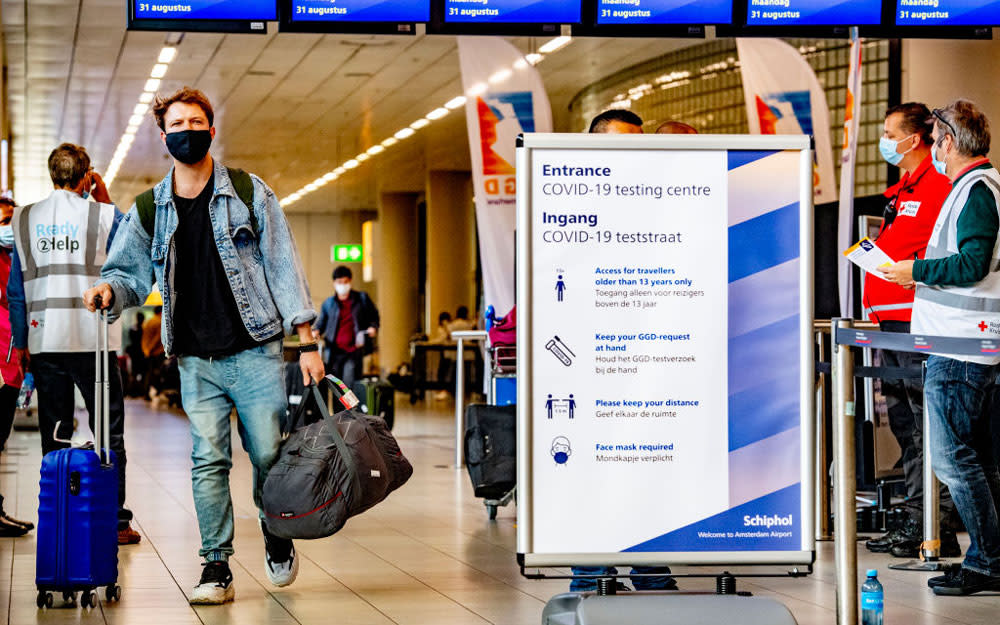What Britain can learn from Iceland's airport testing strategy


The Covid test I was given at Iceland’s Keflavik airport was impressively quick and relatively painless. A dozen or so tiny labs were set up at the exit portals after passport control, at which a pair of efficient and friendly medical staff inserted swabs into each nose and throat.
I’d be lying if I said it didn’t smart a little, but five hours later I received a text giving me the all-clear and was then free to roam the country freely – and without a mask.
That was back in June, shortly after the country opened up to tourism again after closing its borders on March 20. Back then, there was also a 14-day quarantine option, though who wants to go on holiday only to potentially be trapped in their hotel room for two weeks? I was also lucky enough to arrive when the test was free; in July that changed with the introduction of a fee: ISK 9,000 (£50) if paid in advance, ISK 11,000 (£60) at the airport.
The strategy has seemed to work, with tourists trickling into the country slowly but surely. Departures of foreign passengers from Iceland via Keflavik airport numbered around 45,000 in July, according to figures from the Icelandic Tourist Board.
While that pales in comparison to the quarter of a million who passed through in July 2019, it is certainly better than none. And the fact there are way less visitors than usual is of course also a massive boon for those travellers who do visit, as well as locals, since many of the country’s most popular and attractive sites are relatively empty.

Despite some consternation among locals (and health officials) that the tourists might bring Covid in with them, there have only been two new clusters of infections so far – one of which was immediately contained, the other slowed significantly – with both cases allegedly traced back to returning locals rather than tourists.
Nonetheless, since August 19, entry rules have correspondingly grown more stringent, with all passengers now required to undertake a double test procedure – a test at the border, five-day quarantine and follow up test – or the obligatory 14-day quarantine.
“The airport rules are absolutely right in my opinion,” comments local resident John Rogers, former Managing Editor of the capital’s main English-speaking magazine, the Reykjavik Grapevine, which like many local businesses has been struggling financially during the Covid-era.
“Mandatory testing seems like the only way to have a good picture of how incoming travellers correlate with new infections. The new infections here have been pretty low and stable, and reportedly more to do with Icelanders coming home from skiing or beach holidays than incoming tourists. It seems like people are either coming here for a break from the Covid chaos in their own countries, or because they’re sensible Germans holidaying somewhere the virus seems relatively under control. Iceland has felt like an island of sanity compared to what is happening elsewhere, and people want a bit of that for themselves, I think.”
Not everyone shares such a laid-back view on the current restrictions. Following a recent announcement that the city’s BSI bus terminal, which has been running since 1965, is to close unless it gets urgent government support, the managing director of local tour bus company Kynnisferði, Björn Ragnarson told journalists that since infections from tourists have been insignificant, he would like to see less restrictive regulations in place – a sentiment no doubt echoed by many in the beleaguered tourism industry.
This could well happen soon since the government has committed to reassessing the situation every two weeks, and Iceland is well known for its speedy response time. Equally, measures could become stricter. In a recent statement, Prime Minister Katrín Jakobsdóttir explained that "given the uptick in infections worldwide and the widespread effect that a small infection can have on the functioning of our society, the government has decided to strengthen our border-screening measures to further limit the number of infections entering the country,” adding that “these measures will be reviewed and revised according to how the situation develops, both domestically and internationally.”


